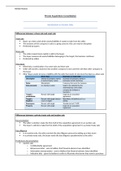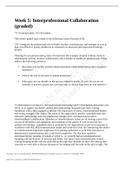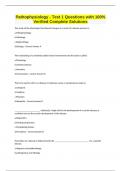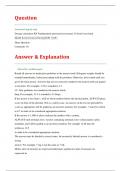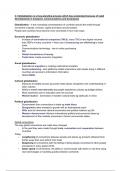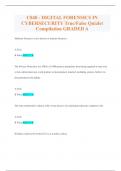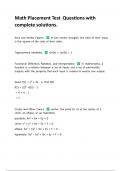Private Acquisitions Consolidation
Introduction to Auction Sales
Differences between a share sale and asset sale
Asset sale
Buyer can cherry pick which assets/liabilities it wants to take from the seller
The business of the company is sold as a going concern; this can result in disruption
Preferred by buyers
Share sale
The entire issued share capital is sold to the buyer
The buyer assumes all assets/liabilities belonging to the target; the business continues
Preferred by sellers
Hive down
Effectively a combination of an asset sale and share sale
Seller will transfer a business into another company it owns and then sell that other company to
the buyer
Why? Buyer wants to leave a liability with the seller but wants to structure the deal as a share sale
Differences between a private treaty sale and auction sale
Documentation
The seller’s solicitors make the first draft of the acquisition agreement in an auction sale
The buyer’s solicitors make the first draft of the acquisition agreement in a private treaty sale
Due diligence
In an auction sale, the seller controls the due diligence process by setting up a data room
In a private treaty sale, the buyer sends the due diligence questionnaire to the seller
Preliminary documentation
Auction sale –
o Confidentiality agreement
o Bid process letter - sent to bidders that financial advisors have identified
o Information memorandum - sent to bidders that financial advisors have identified
o Indicative bids – given by bidders to seller to illustrate what terms they want to purchase
,Hafsah Nawaz
on
o No exclusivity agreement until preferred bidder is chosen
Private treaty sale –
o Heads of terms – non-binding
o Confidentiality agreement
o Exclusivity agreement
Advantages and disadvantages of an auction sale
Advantages for the seller Disadvantages for the seller
Seller can reach a larger pool of potential buyers Not all businesses are suitable for sale by auction
e.g. if there are only 1 or 2 potential buyers
Maximises price by encouraging potential buyers May be inappropriate where the structure of the
to bid against each other target is complicated or if there are lots of external
factors affecting the transaction e.g.
regulation/competition
Should enable the seller to secure better sale Seller’s transaction costs are usually higher as a
terms than might be achieve on a bilateral sale as bank is enlisted to advise on the auction process
the competitive nature should encourage bidders and the lawyers will be drafting the transaction
to keep their amendments to a minimum documents
Seller can run simultaneous negotiations with Significant time commitment for the seller so could
more than 1 bidder allowing it to defer impact management responsibilities
commitment to 1 bidder until the principal deal
terms have been settled
Seller controls the due diligence process, including Some bidders may not be serious about acquiring
the number/scope of documents it will share with the target and are interested only in finding out
participating bidders information about a competitor (and there is no
real remedy for this bar confidentiality
undertakings)
Seller can control the transaction timetable The knowledge that a business is for sale inevitably
disturbs the normal conduct of business and may
lead to loss of sales and staff while the process sis
underway
Can assist directors in showing to shareholders and If the auction doesn’t result in a sale, the failure
creditors that the best price has been obtained for will be public resulting in the target being seen as
the target ‘damaged goods’
Advantages for the bidder Disadvantages for the bidder
If there is not that much uptake or enthusiasm for May be forced to pay a higher price for the target
the auction, a bidder may be able to get the target than it might have done had it been the only suitor
for cheaper on a private treaty due to the competitive nature.
In addition, the seller may pass on their
professional fees occurred in organising the
auction process to the buyer
If entering into the auction on bad faith, the bidder The presence of other bidders reduces its chances
could get further insight into the target and use of concluding a successful deal, thereby increasing
such knowledge anti-competitively the risk of wasting management time and
professional fees on an abortive deal
Less negotiations- may be quicker and cheaper in Bidders are more likely to receive more limited due
terms of legal costs as the seller is drafting the diligence information about the target than they
agreement, setting up the data room etc. would be able to ascertain via the DD
questionnaire on a private treaty
Level of warranties/indemnities given by the seller
are likely to be lower as the seller drafts the first
,Hafsah Nawaz
version of the acquisition agreement
Key legal issues arising at the start of a transaction
FSMA and FSA restrictions (SHARE SALE ONLY)
Note- FSMA restrictions can apply to clients as well as to their solicitors
Prohibition Exemption
S19(1) FSMA – general prohibition on carrying out Art. 70 RAO – where 50% or more of voting shares
regulated activities unless authorised or exempt in a company are being sold (doesn’t apply to
public takeovers)
The auction process relating to the seller could
involve a specified activity such as- Art. 28 RAO – arranging transactions to which the
Art. 14 RAO- dealing in investments arranger is a party; this could potentially apply to
Art. 25 RAO- arranging deals in investments the seller as it is one of the parties to the
agreement
The auction process relating to the solicitors could
fall under the general prohibition as they could be Art. 29 RAO – solicitor may be able to rely on
held as- exemption that the deal is arranged through an
Art. 53 RAO- advising on the merits authorised person i.e. the seller’s financial advisor
Art. 25 RAO- arranging deals in investments
S21 FSMA – criminal offence for financial Art. 62(2) FPO – if the communication relates to a
promotions unless authorised or contents transaction to acquire or dispose of shares in a
approved by an authorised person body corporate and either:
(a) The shares carry +50% voting rights, or
An information memorandum may constitute a (b) Together with shares already held, they
financial promotion carry not less than 50% voting rights,
and
(c) In either case, the seller and buyer is
company, partnership, individual or group
of connected individuals
Art. 62(2)(b)(ii) FPO – if the communication relates
to a transaction with the aim of acquiring or
disposing shares in a company and the object of
the transaction may reasonably be regarded as
being the acquisition of day-to-day control of the
company
Art. 19(1) FPO – the IM is only being distributed to
investment professionals
Art. 49(2)(a) FPO – communication is made to any
company which has, or which is, a member of the
same group as an undertaking which has, a called
up share capital or net assets of not less than
£500,000 (if +20 members, or is a subsidiary of a
co. which has +20), or otherwise £5m
S85(1) FSMA – if shares are being offered to the S86(1) FSMA – no need for a prospectus if it is
public, need a prospectus being sent to less than 150 people, or only to
qualified investors
S89 FSA – criminal offence for a person to do any N/A
of the following:
(a) Make a statement which is knowingly Seller and its advisors are advised to not overstate
, Hafsah Nawaz
false or misleading the level of interest in the target.
(b) Conceal dishonestly material facts
(c) Make recklessly a statement that is false Smith New Court v Scrimgeour Vickers –
or misleading overstating the degree of interest/terms offered by
which has the impact of inducing someone to enter other bidders to maximise competitive tension in
into or offer to enter into an investment an auction could be regarded as fraudulent
agreement misrepresentation
Concerns for a listed company seller
Compliance with Disclosure and Transparency Rules
o These include an obligation on a listed company to disclose major new developments in
its sphere of activity if the information is not already public knowledge and it may have a
significant effect on the company’s share price
o This is generally not desirable when negotiating the sale/purchase of a business or
company, for confidentiality reasons
o Disclosure can be delayed so as to not prejudice legitimate interests provided that-
The delay would not mislead the public, and
Anyone who does receive the info owes a duty of confidentiality to the listed
company, and
The listed company can ensure the confidentiality of the information
o Obligation to inform the FCA if there is a delay by submitting a prescribed form
Related Party Transactions (LR 11)
o This is only relevant if the transaction is between a listed company (or one of its
subsidiaries) and a substantial shareholder/director/shadow director
o If so, any shareholder approval needed could affect timing
o A related party transaction is more likely to arise on a management buy-out
o Exception for small transactions i.e. where all the ratios are equal to or less than 0.25%
Class tests
o Thresholds for classifying transactions-
Class 1 – if any ratio is 25% or more, but less than 100%
Class 2- if any ratio is 5% or more but all ratios are less than 25%
o Consequences of being Class 1-
RIS must be notified and provide with prescribed details of the transaction ASAP
once terms have been agreed
Explanatory circular to be sent to members
Prior shareholder (OR) approval needed
Timetable will be affected to factor in prep of the circular and its approval by
FCA; exchange and completion will be split as GM will be needed
o Consequences of being Class 2-
RIS must be notified and provide with prescribed details of the transaction ASAP
once terms have been agreed
Other considerations
Regulatory consents
o If the Target company or any part of its Group is FCA-regulated, it is a criminal offence for
the buyer not to obtain FCA approval if a holding of at least 10% is changing hands;
o Consent of the Secretary of State may be necessary if the deal involves a newspaper
merger; or
o Consent of the relevant regulator may be required e.g. if a company with oil / gas interests
is being acquired.
Shareholder consents
o Check AA – is consent for acquisition required?
o Further consents may be needed if the acquisition involves any of the following, which will
add to the transaction timetable –
New long-term contracts involving a term longer than 2 years (s188 CA)


